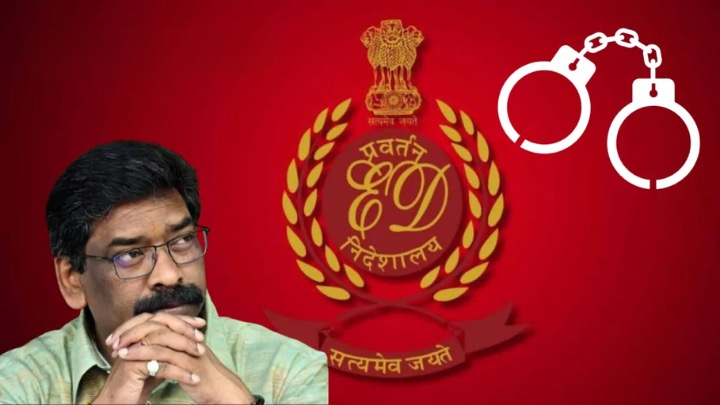Enforcement Directorate (ED) Arrests Jharkhand CM in a Corruption Case (Indian Express)

- 01 Feb 2024
Why is it in the News?
Recently Jharkhand CM Hemant Soren was arrested by the officials of the Enforcement Directorate (ED) in the land scam case.
News Summary:
- Jharkhand CM Hemant Soren became the third state chief minister to be arrested after the Enforcement Directorate took him into custody in a money laundering case.
- Before Hemant Soren, his father Shibu Soren and Madhu Koda were arrested.
- He was arrested in a case related to an illegal change of ownership of land in Jharkhand.
What is the Enforcement Directorate (ED)?
- The Enforcement Directorate (ED) is a multi-disciplinary agency tasked with investigating money laundering offenses and violations of foreign exchange laws.
- It operates under the Department of Revenue within the Ministry of Finance and upholds strict compliance with the Constitution and laws of India.
Structure:
- Headquarters: Located in New Delhi, the ED is headed by the Director of Enforcement.
- Regional Offices: The agency has five regional offices situated in Mumbai, Chennai, Chandigarh, Kolkata, and Delhi, each overseen by Special Directors of Enforcement.
- Recruitment: Officers are recruited directly and transferred from other investigative agencies, comprising personnel from the Indian Revenue Services (IRS), Indian Police Services (IPS), and Indian Administrative Services (IAS), including roles such as Income Tax officers, Excise officers, Customs officers, and police officials.
- Tenure: Typically, officers serve a two-year term, extendable to five years with three annual extensions.
- Amendments to the Delhi Special Police Establishment (DSPE) Act, 1946, and the Central Vigilance Commission (CVC) Act, 2003, enable the government to extend the tenure of directors for one year after completing their initial two-year terms.
Functions:
- COFEPOSA: Empowered by the Conservation of Foreign Exchange and Prevention of Smuggling Activities Act, 1974 (COFEPOSA), the ED can initiate cases of preventive detention related to violations of the Foreign Exchange Management Act (FEMA).
- Foreign Exchange Management Act, 1999 (FEMA): This civil law aims to regulate external trade and payments, with the ED responsible for investigating suspected contraventions, adjudicating cases, and imposing penalties.
- Prevention of Money Laundering Act, 2002 (PMLA): Enacted to combat money laundering, the ED is tasked with tracing assets derived from crime proceeds, attaching property, and prosecuting offenders through Special Courts.
- Fugitive Economic Offenders Act, 2018 (FEOA): Introduced to address economic offenders seeking refuge abroad, the ED enforces this law by attaching properties of fugitives and confiscating assets, thereby deterring offenders from evading Indian law.
